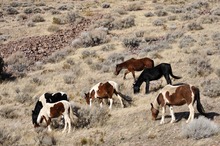An independent report shows that the Bureau of Land Management’s Wild Horse Program is ineffective, and the new study echoes The Humane Society of the United Stes'concerns.

Wild mustangs subject to roundup
According to the report, the BLM needs to stop relying on short-sighted wild horse roundups, and instead make immediate changes necessary to set the program on a long-term, humane and financially sustainable path.
© 2013 by Carien Schippers
A panel assembled by the National Academies of Science’ National Research Council, at the request of the U.S. Bureau of Land Management, released its findings and recommendations after a two-year-long review of the government’s wild horse and burro management program.
Much of the independent panel’s observations are congruent with those of The Humane Society of the United States—that the agency needs to stop relying on short-sighted roundups, and instead make the immediate changes necessary to set the program on a long-term, humane and financially sustainable path.
In response to the report, Holly Hazard, senior vice president of programs and innovations for The HSUS, issued the following statement:
“The current wild horse program has been a fiscal and animal-welfare disaster, and the BLM needs to get off this treadmill. It’s time for a new way forward that is better for horses and better for taxpayers.
“We’re pleased to see that many of the committee’s key findings echo the long-standing concerns that The Humane Society of the United States has posed to the department. We hope that the new leadership will take these findings seriously and begin to make management decisions through a collaborative process that involves both the agency and the public, as recommended in the report.
To that end, The HSUS has developed a proposal to present to the agency for a bold new program that meets the challenges of the budget, the horse population and land-use issues head on. We plan to present this to the department within the next few weeks.”
The National Academies of Science report
The Humane Society of the United States is the nation’s largest animal protection organization, rated the most effective by its peers. Since 1954, The HSUS has been fighting for the protection of all animals through advocacy, education and hands-on programs. We rescue and care for tens of thousands of animals each year, but our primary mission is to prevent cruelty before it occurs. We're there for all animals, across America and around the world.
